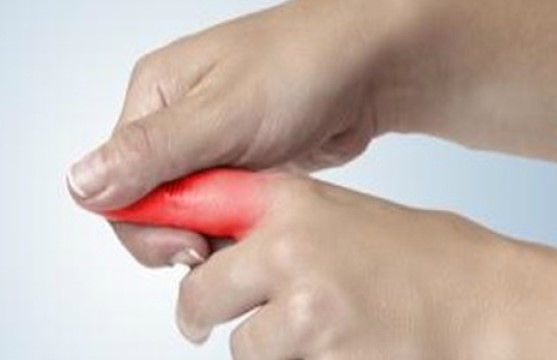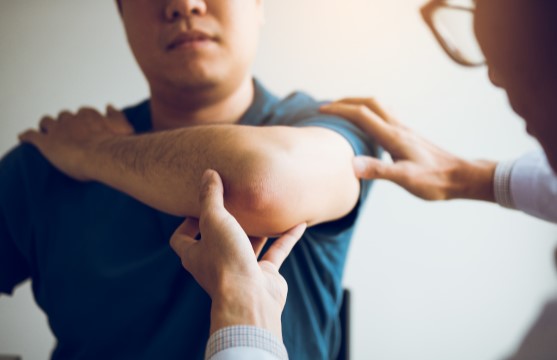Swollen fingers and toes that can become painful. Dactylitis most commonly affects one or two fingers or toes at a time.

Psoriatic Arthritis
Psoriatic arthritis is a type of arthritis that may occur alongside psoriasis. Psoriatic arthritis usually affects the joints, causing inflammation (swelling), stiffness and pain. Like psoriasis, psoriatic arthritis is a long-term condition.
Psoriatic arthritis is a type of disease known as an autoimmune condition. The immune system is the body’s natural self-defence system, and it normally protects us from infections and illness. Auto-immune conditions cause the body’s immune system to mistakenly attack the body’s healthy tissues, such as the joints, causing inflammation.
Inflammation is normally an important tool the immune system uses to fight an infection by sending extra blood and fluid. However, in psoriatic arthritis the inflammation and extra fluid in a joint can cause pain and stiffness as well as permanent damage to the joint.
What are the symptoms of psoriatic arthritis?
The main symptoms of psoriatic arthritis are joint pain, swelling and stiffness. Psoriatic arthritis can cause problems in any joint in the body, but the condition often affects the hands, feet, knees, neck, spine and elbows.
Psoriatic arthritis can be different from person to person. Some people may have severe problems affecting many joints, whereas others may only notice mild symptoms in 1 or 2 joints.
There may be times where symptoms get better (remission) and periods when they get worse (flares).
The main symptoms of psoriatic arthritis are:
Dactylitis

Swollen fingers and toes that can become painful. Dactylitis most commonly affects one or two fingers or toes at a time.
Pain and stiffness

Affected joints can often feel stiff and painful. For example, you may not be able to fully bend your fingers if your hands are affected. Pain and stiffness is often worse in the mornings and after periods of inactivity.
Swelling, redness and warmth

Inflammation in the lining of joints, this can cause joints to swell, and become hot and tender to the touch.
Enthesitis

A painful inflammation where bones attach to ligaments or tendons. Common sites include the top of the shin bone, behind or under the heel and where the ribs join the breastbone. If your ribs are affected, you may experience chest pain and find it hard to breathe deeply.
Uveitis

Signs of uveitis are painful, watery or red eyes, blurred vision and sensitivity to bright light.
Other psoriatic arthritis symptoms
Some people with psoriatic arthritis can experience a range of more general symptoms, like:
What causes psoriatic arthritis?
Psoriatic arthritis can occur without psoriasis. It has been shown to affect between 20–40% people with psoriasis. Psoriatic arthritis can sometimes develop after you've had psoriasis for many years.
As previously mentioned, psoriatic arthritis is an autoimmune condition, which means it's caused by the immune system attacking healthy body tissue. However, it’s not yet known what triggers this or why some people with psoriasis develop psoriatic arthritis and others don’t.
Normally, your immune system works to produce certain chemicals that attack viruses and bacteria, helping to fight infection. In psoriatic arthritis, your body’s immune system mistakenly sends these chemicals to the lining of joints, where they cause pain and inflammation of the tissue around the joint.
Psoriatic arthritis risk factors
There are a few things that may increase the risk of developing psoriatic arthritis, including:
Genetics
The genes you inherit from your parents and grandparents can make you more likely to develop psoriatic arthritis.
Environmental factors
Many things, such as a virus, infection, trauma of some kind, or having a very stressful event in your life.
Smoking
Some evidence suggests that smoking is associated with psoriatic arthritis.
The information provided on this website is not a substitute for professional medical care. If you have any concerns about your health or medicine, you should consult your healthcare specialist or general practitioner.
If you get any side effects, talk to your doctor, pharmacist or nurse. This includes any possible side effects not listed in the patient information leaflet. You can also report side effects directly in the UK via the Yellow Card Scheme website: https://yellowcard.mhra.gov.uk/ or via the the MHRA Yellow Card App in the Google Play or Apple App Store. In Ireland please report via the HPRA at https://www.hpra.ie/homepage/about-us/report-an-issue.
You can also report adverse events to UCB at UCBCares.UK@ucb.com or UCBCares.IE@ucb.com.
Would you recommend the UCBCares website to other visitors?